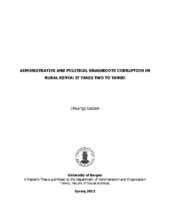Administrative and political grassroots corruption in rural Kenya: It takes two to tango
Master thesis
Permanent lenke
https://hdl.handle.net/1956/5998Utgivelsesdato
2012-06-07Metadata
Vis full innførselSamlinger
- Department of Government [457]
Sammendrag
This thesis describes public sector corruption in a rural setting of Kenya. It also assesses the effects of civil service wage on reported cases of corruption in the Kenyan public sector. It argues that understanding public sector corruption by primarily focusing on actions of public officials, merely presents half the arena of the practice of corruption in a country like Kenya. Thus, apart from looking at the role of public officials, it is also important to point out contributions being made by service/favor seekers in initiating or completing an act of corruption. By basing its data on a rural setting (Migori district and its surroundings), the thesis implies that knowledge on how corruption is practiced at grassroots may present unit of analysis for understanding cases of grand corruption, that is reported in high places of Kenyan government.Data for this thesis are presented in three parts: Part one focuses on describing corruption from the perspective of public officials. This part shows how politicians and civil servants co-operate in the embezzlement of funds meant for rural development. Part two looks at how various forms of corruption are practiced by both service/favor seekers and civil servants, and possibilities for such practices to take place. This part argues that both parties are able to initiate corrupt actions, and are therefore both responsible in the creation of favorable environments for corrupt practices. The third part presents data on the role of civil service wage vis-à-vis acts of corruption in the public sector. It finds out that data on the role of wages are inadequate as well as too simplistic to explain the complexity surrounding why civil servants may engage in corruption. Therefore, albeit necessary in explaining some cases of petty corruption, civil service wage is not sufficient in giving structural explanations as to why civil servants practice corruption. This thesis realizes that it is even difficult to find adequate qualitative data to generate empirical concrete discussions on the role of civil service wage in the practice of public sector corruption. The thesis concludes by summarizing key arguments and contributions it makes to corruption research.
